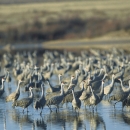Visit Us
National wildlife refuges offer us all a chance to unplug from the stresses of daily life and reconnect with our natural surroundings. Visitors can enjoy the auto tour road, watching wildlife, hiking, camping and picnicking.
Driving Directions
Refuge headquarters may be reached from U.S. 60 (east and west) and from Interstate 27 (north and south) to U.S. 60. The entrance road is located 1.5 miles south of Umbarger, Texas on F.M. 168. Umbarger is 10 miles west of Canyon and 20 miles east of Hereford on U.S. 60, approximately 30 miles southwest of Amarillo, Texas. The coordinates for navigation are 34.919517, -102.111118.
Fees
Entrance fees are $2 per vehicle.
Restrooms
Restrooms are available at the campground.
Points of Interest
Visitors can drive along the auto tour road to enjoy the different habitats of the refuge and see wildlife along the way. Hiking on the trails can get you closer to nature. The campground has picnic tables to enjoy.
What To Do
If you have 15-minutes.
- Take a brisk walk on the Cottonwood Canyon Birding Trail
- Enjoy the Overlook
- Walk the Prairie Dog Trail and look for prairie dogs
If you have one hour.
- Walk the Cottonwood Canyon Birding Trail
- Walk the Grassland Loop
- Enjoy the Auto tour loop
- Have a picnic
If you have half a day or more.
- Camp and picnic
- Walk the trails
- Cottonwood Canyon Birding Trail
- Cottonwood Hiking Trail
- Grassland Loop
- Prairie Dog Trail
- Auto tour Loop
Know Before You Go
- Bring enough water to enjoy your day.
- Closed toed shoes are recommended for the trails.
- Sunscreen and bug spray may make your visit more enjoyable.
- Binoculars and other wildlife viewing items will be helpful to observe some wildlife.
Visitor Tips
Wildlife is most likely to be seen in the morning and evening hours when temperatures are cooler.
Activities
Buffalo Lake offers a variety of activities to enjoy. Visitors can enjoy many wildlife-dependent activities such as hiking, wildlife observation and photography, and camping and picnicking.
Trails
Cottonwood Canyon Birding Trail
- Open Season: Open year round
- Length: 1 mile
- Location of trail: Below the Overlook to the north
- Surface: Natural substrate of grass and dirt
- Difficulty: Moderate
- Information: The Cottonwood Canyon Birding Trail begins and ends at the parking area below the Overlook. This trail is located along the old lakebed with cottonwood, elm, and osage orange trees lining most of the trail. The upper portion of the trail is more rugged and uneven surfaces may be present.
Cottonwood Hiking Trail
- Open Season: Open year round
- Length: 1.25 miles
- Location of trail: Below the Overlook to the south
- Surface: Natural substrate ADA complainant
- Difficulty: Moderate
- Information: The Cottonwood Hiking Trail begins and ends at the parking area below the Overlook. This trail can either be an out and back or it connects with the Grassland Loop. This trail along the old lakebed with cottonwood and elm trees lining the majority of the trail.
Grassland Loop
- Open Season: Open year round
- Length: 2 miles
- Location of trail: The Overlook
- Surface: Natural substrate consisting of dirt, caliche, and grass with uneven surfaces present.
- Difficulty: Challenging
- Information: The Grassland Loop begins and ends at the Overlook. This winding trail leads visitors through mixed grass prairie along the caprock before connecting to the Cottonwood Hiking Trail.
Prairie Dog Trail
- Open Season: Open year-round
- Length: 0.25 miles
- Location of trail: F.M. 168 at the Prairie Dog Town parking area
- Surface: Crushed caliche, ADA compliant
- Difficulty: Easy
- Information: Walk along the edge of a black-tailed prairie dog town through the High Plains National Natural Landmark National Natural Landmark
The National Natural Landmarks Program preserves sites illustrating the geological and ecological character of the United States. The program aims to enhance the scientific and educational value of the preserved sites, strengthen public appreciation of natural history and foster a greater concern for the conservation of the nation’s natural heritage. The program was established in 1962 by administrative action under the authority of the Historic Sites Act of 1935. The first National Natural Landmarks were designated in 1963. Today, there are more than 600 National Natural Landmarks in 48 states, American Samoa, Guam, Puerto Rico and the U.S. Virgin Islands.
Learn more about National Natural Landmark .
Other Facilities in the Complex
Rules and Policies
- Pets must be on a leash or under control.
- Horses and horseback riding are prohibited on the refuge.
- Hunting is prohibited except through special drawing by Texas Parks and Wildlife.
- Capturing of any wildlife including horned lizards, snakes, and turtles is prohibited.
- Pits or permanent blinds are prohibited.
- Use caution when walking on roads. Yield to approaching vehicles.
- Observe wildlife from a safe distance. Young animals should be left alone.
- Help protect resources. All plants, wildlife, and cultural features on the refuge are protected and it is illegal to remove them.
- Open fires are prohibited.
- Persons possessing, transporting, or carrying firearms on National Wildlife Refuges must comply with all provisions of state and local law. Persons may only use (discharge) firearms in accordance with refuge regulations.
- Camping is allowed in designated camping areas.
- Visitors are encouraged to take photos within areas open to the public. Photographers wanting to access closed areas or whose parties are larger than 8 people must apply for a Special Use Permit.
- The releasing of animals wild or domestic on the refuge is prohibited.
- No flying objects (i.e. Drones)
- No swimming or wading in water

